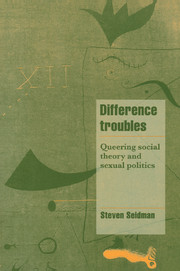Book contents
- Frontmatter
- Contents
- Preface
- Acknowledgements
- Introduction: the contemporary reconfiguring of social theory
- Part I Resisting difference: the malaise of the human sciences
- Part II Engaging difference: from lesbian and gay studies to queer theory
- Part III Democratic prospects: the politics of knowledge and identity
- Epilogue: pragmatism, difference and a culture of strong democracy
- Notes
- References
- Index
Introduction: the contemporary reconfiguring of social theory
Published online by Cambridge University Press: 05 October 2010
- Frontmatter
- Contents
- Preface
- Acknowledgements
- Introduction: the contemporary reconfiguring of social theory
- Part I Resisting difference: the malaise of the human sciences
- Part II Engaging difference: from lesbian and gay studies to queer theory
- Part III Democratic prospects: the politics of knowledge and identity
- Epilogue: pragmatism, difference and a culture of strong democracy
- Notes
- References
- Index
Summary
In academic and public life in the United States, in many European nations, and elsewhere, major social conflicts now pivot upon how to think about social differences. Do cultural differences (ethnic, racial, national, gender, sexual, or religious) override human or social commonalities? Should public policy, law, and institutional norms take account of social differences? If differences structure moral and epistemic values, how does this affect the shape of knowledge? And how should political organizations and movements organize themselves around social differences? Diversity management practices in corporations, multicultural curricula in schools, the discursive politics of deconstruction – in these and numerous other areas the “problem of difference” is a key issue today for policy makers, educators, corporate leaders, unions, social activists and, most importantly for this book, intellectuals.
For intellectuals, this reconfiguring of the field of public debate and conflict has been marked by the emergence of a new division between “modernists” and “postmodernists.” The former are said to defend cultural universalism and the idea of Western social progress; the latter criticize the former as holding an increasingly anachronistic world view based on narratives of reason and progress which conceal the dynamics of domination and social control. At the core of this debate is the meaning of social differences for concepts of reason, morality, and democracy. Modernists tend to defend universalism or the idea of a transcendent truth and morality that ultimately appeals to some notion of the unity of reason or humanity.
- Type
- Chapter
- Information
- Difference TroublesQueering Social Theory and Sexual Politics, pp. 1 - 18Publisher: Cambridge University PressPrint publication year: 1997
- 1
- Cited by

